Introduction
Navigating the complexities of adulthood with autism presents unique challenges that many individuals face without adequate support or recognition. With a significant portion of the autistic population receiving diagnoses later in life, understanding the diagnostic process and the importance of both formal and self-diagnosis becomes critical. This journey often involves navigating through personal history, behavioral assessments, and standardized tests, while also acknowledging the limitations and potential flaws within the traditional medical testing model.
The transition into adulthood can be particularly daunting for autistic individuals, impacting social interactions, employment, and independence. Despite a strong desire to work, autistic adults frequently encounter significant barriers to employment and fair compensation. Real-life stories, such as that of Chelsia Potts, highlight the unexpected and often delayed recognition of autism, underscoring the need for ongoing support and tailored strategies to navigate daily life.
Support systems and community resources play an essential role in fostering a sense of belonging and providing the necessary assistance for autistic adults. Initiatives like the Interagency Autism Coordinating Committee (IACC) and the Adult Autism Health Resources project aim to enhance coordination, improve medical care, and ensure continuous support throughout an individual's life. Empowering autistic adults through self-advocacy and education is crucial for accessing resources, achieving independence, and fostering inclusivity within society.
By understanding these challenges and leveraging effective strategies, autistic adults can lead fulfilling lives, supported by communities that recognize and address their unique needs.
Understanding Adult Autism Diagnosis
Navigating an adult autism diagnosis can seem daunting, but understanding the process is crucial. Many individuals may have been missed in childhood, leading to later diagnoses in adulthood. The diagnostic journey often involves a thorough assessment that includes personal history, behavioral observations, and standardized tests. However, it's important to note that individuals on the spectrum and the neurodivergent community are very open to self-diagnosis. Numerous grown individuals discover that the conventional medical assessment approach for developmental disorders can be imperfect, frequently producing ambiguous outcomes. As one community member highlighted, if an official diagnosis doesn't impact the support you need, it might not be necessary to undergo the formal process.
The journey to diagnosis is highly individualized. For some, like those participating in the Adult Autism Health Resources initiative, the pursuit of a diagnosis is about gaining access to necessary services and medical care. As Dr. Christopher McDougle from Harvard Medical School notes, “autistic individuals may live as long as the rest of us but once they graduate high school they no longer qualify for many services or receive guidance about ongoing medical care.” This initiative serves as a crucial acknowledgment of the existing adult autistic population, emphasizing the need for quality medical care akin to that available for neurotypical individuals.
Furthermore, the Interagency Autism Coordinating Committee (IACC) plays a significant role in enhancing research and services related to this condition. 'Comprising officials from various federal agencies and community stakeholders, the IACC aims to enhance coordination and communication across the government and with individuals impacted by developmental disorders.'. Their efforts are geared towards accelerating progress and addressing the unique needs of individuals with autism.
Ultimately, comprehending the nuances of spectrum disorder (ASD) in adults is key to recognizing their unique challenges and strengths. Awareness of the signs and symptoms in adulthood can empower individuals to seek the support they need, whether through formal diagnosis or self-identification.
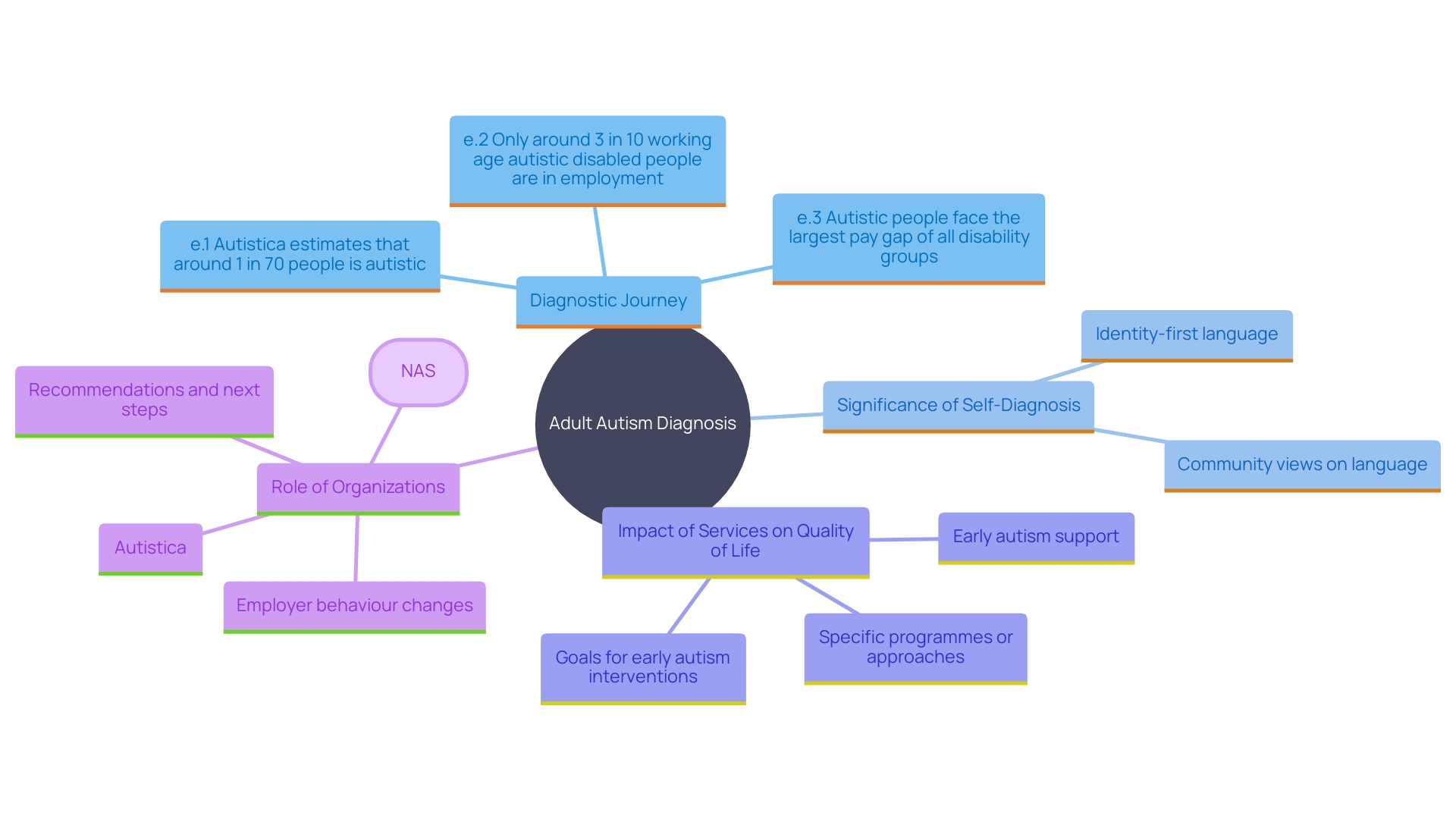
Challenges and Transitions in Adulthood
Navigating adulthood with a developmental condition encompasses various challenges, including social interactions, employment, and independence. Approximately 1 in 45 individuals in the U.S. are diagnosed with autism spectrum disorder (ASD), with many more probably undiagnosed or misdiagnosed. Autistic adults often face difficulties in understanding social cues, maintaining relationships, and managing daily life demands. For example, transitions such as moving from school to work or starting a family can be particularly daunting without adequate support.
Employment remains a significant hurdle. 'Despite a strong desire to work, only about 3 in 10 working-age individuals with disabilities are employed, compared to 5 in 10 for all disabled people and 8 in 10 for non-disabled individuals.'. This disparity is further compounded by a substantial pay gap, with autistic people earning a third less than their non-disabled peers on average.
Real-life stories highlight these challenges. For instance, Chelsia Potts, diagnosed with a developmental condition along with her daughter, exemplifies the unexpected journey many face. After achieving a doctorate and rising to a high-level academic position, she only discovered her autism in adulthood. Such stories emphasize the significance of acknowledging and responding to the distinct requirements of individuals on the spectrum.
Initiatives to enhance the lives of individuals on the autism spectrum are continuing. Projects such as the Adult Autism Health Resources initiative seek to inform healthcare providers, family members, and self-advocates, guaranteeing that individuals on the spectrum receive the same standard of medical treatment as those with typical neurological development. As Dr. Christopher McDougle from Harvard Medical School observes, this initiative is a wake-up call to recognize and support the current group of individuals on the spectrum.
Grasping these challenges is the initial phase in discovering effective approaches and support networks, assisting individuals on the spectrum in leading satisfying lives.
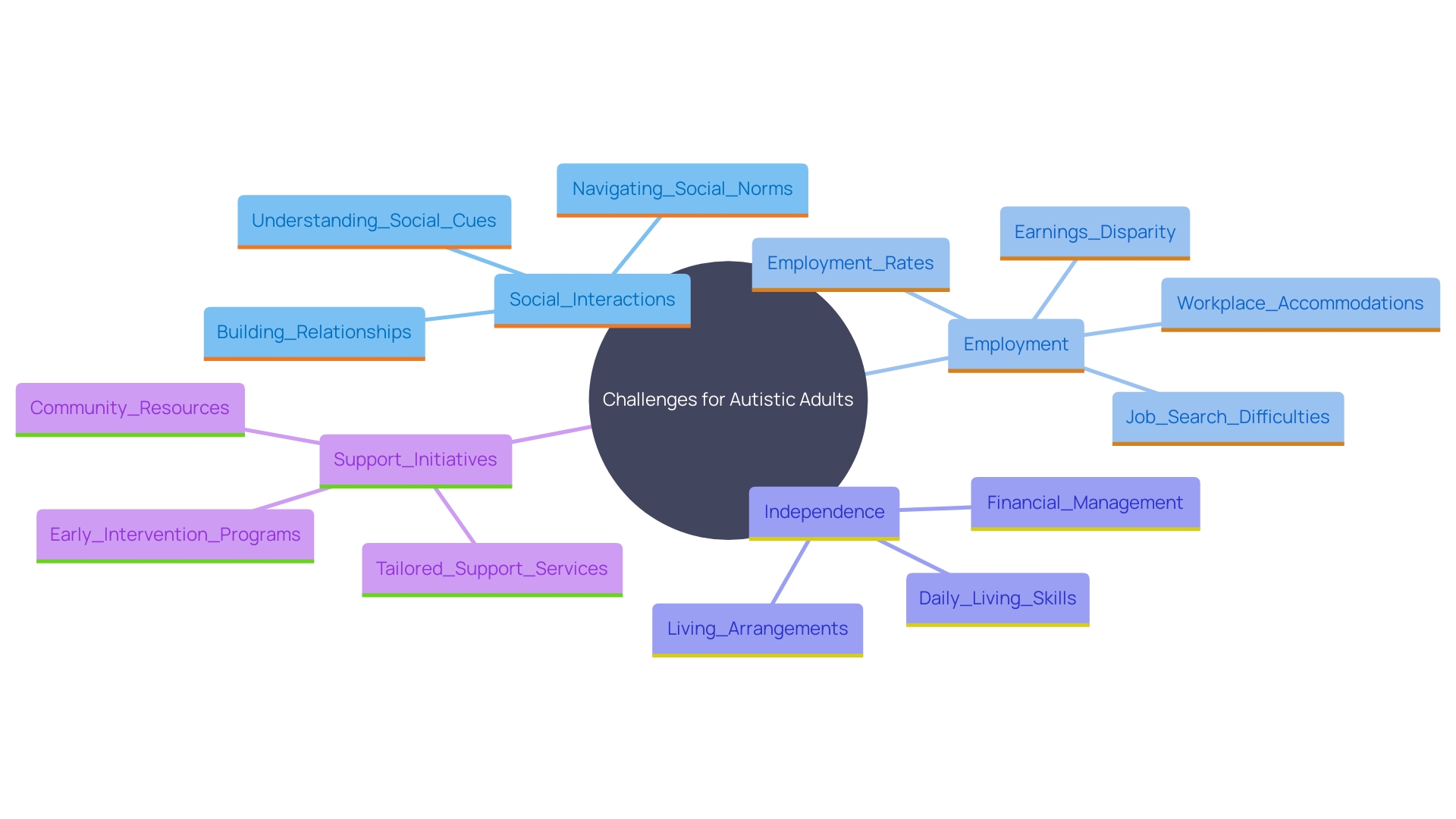
Importance of Support Systems and Community
A robust support network is essential for individuals on the spectrum, including family, friends, support groups, and experts who comprehend their distinctive requirements. Community resources play a vital role in creating networks of understanding and shared experiences, fostering a sense of belonging and acceptance. An example of such initiatives is the IACC, a federal advisory committee that improves coordination and communication across research and services related to developmental disorders. Including various participants, such as individuals on the spectrum and their relatives, the IACC represents the diverse knowledge and viewpoints within the autism community. This partnership emphasizes the significance of not just acknowledging but also meeting the continuous healthcare requirements of individuals on the spectrum. As Christopher McDougle from Harvard Medical School points out, many services cease once individuals on the spectrum graduate high school, underscoring the necessity for continuous support throughout their lives. By connecting with others who have comparable experiences, individuals on the spectrum can find empowerment and reassurance, reinforcing that they are not alone in their journey.
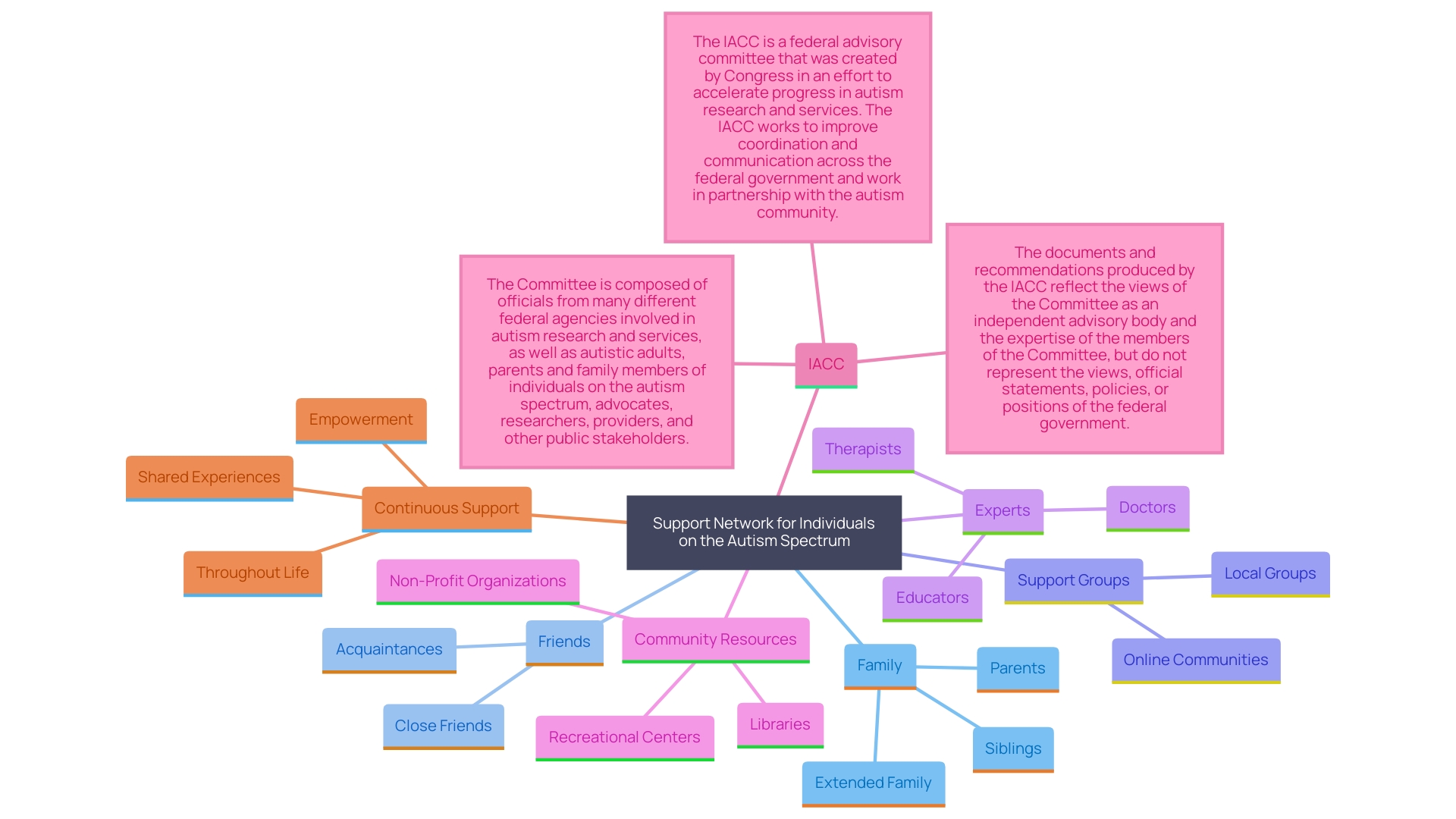
Strategies for Navigating Daily Life
Creating effective approaches for daily living is essential for individuals on the autism spectrum. Considering that 1 in 45 individuals in the U.S. are diagnosed with autism spectrum disorder (ASD), it's essential to establish organized routines to assist in managing time efficiently. Utilizing visual aids for organization can significantly enhance daily functioning and reduce stress, contributing to greater independence. Practicing self-care techniques customized to personal preferences further supports this goal.
Learning to communicate needs clearly is another essential aspect. According to the Adult Autism Health Resources initiative, many individuals on the spectrum lose access to essential services after high school, underscoring the importance of effective communication in navigating adulthood. Setting achievable goals can also bolster confidence and ensure steady progress.
Adapting these strategies to suit personal strengths and preferences is essential. As Dr. Christopher McDougle from Harvard Medical School emphasizes, individuals on the autism spectrum require access to quality medical care and support, just like neurotypical individuals. By acknowledging and utilizing individual strengths, individuals on the spectrum can lead more satisfying and self-sufficient lives.
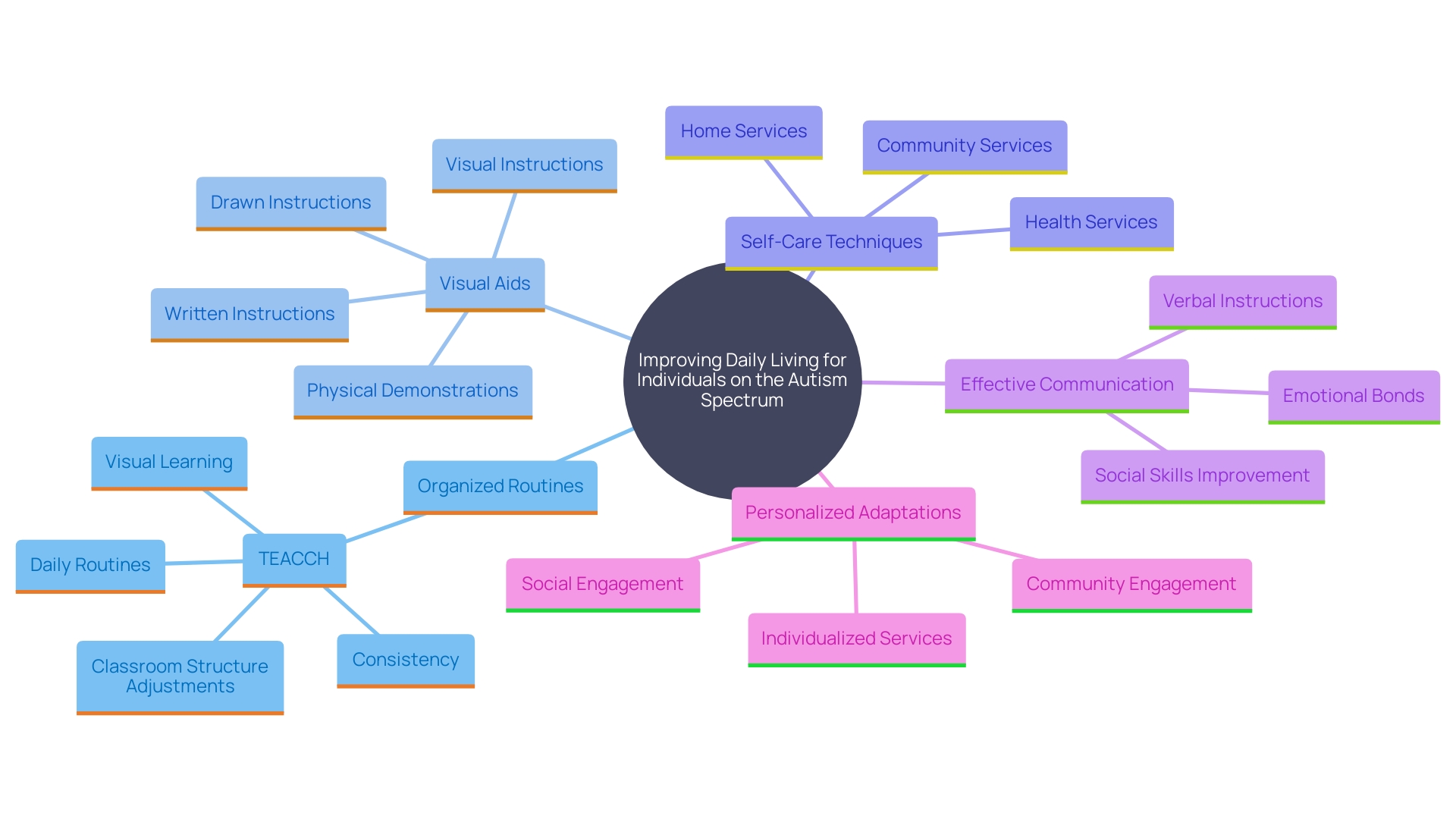
Empowerment Through Self-Advocacy and Education
Self-advocacy is an indispensable tool for autistic adults, allowing them to better access resources and services by understanding their rights and options. Educating themselves about autism and its impact on their lives empowers them to articulate their needs and seek appropriate support. This empowerment not only advantages the person but also raises awareness and understanding within the wider community, fostering a more inclusive society.
Autistica estimates that approximately 1 in 70 people are on the spectrum, translating to about 1 million persons in the UK. Despite a strong desire to work, only around 3 in 10 working-age individuals with disabilities are employed, compared to 5 in 10 for all disabled individuals and 8 in 10 for non-disabled individuals. This stark disparity highlights the importance of self-advocacy in fighting for equal opportunities and fair treatment in the workplace.
Inclusion is a philosophy based on the belief that every person, regardless of their label, belongs to their community. Supporting individuals on the spectrum through education and self-advocacy is a vital step towards achieving this inclusivity. As David H. Roberts from Harvard Medical School notes, initiatives aimed at educating clinicians, caregivers, and self-advocates can lead to meaningful change across healthcare systems, ensuring that people on the spectrum receive the quality medical care they deserve.
Efforts to enhance autism support and the lives of individuals on the spectrum and their families are crucial. Christopher McDougle from Harvard Medical School emphasizes that individuals on the spectrum may live as long as neurotypical individuals but often lose access to services and support after high school. By advocating for themselves and staying informed, autistic adults can navigate these challenges and access the necessary resources to thrive.
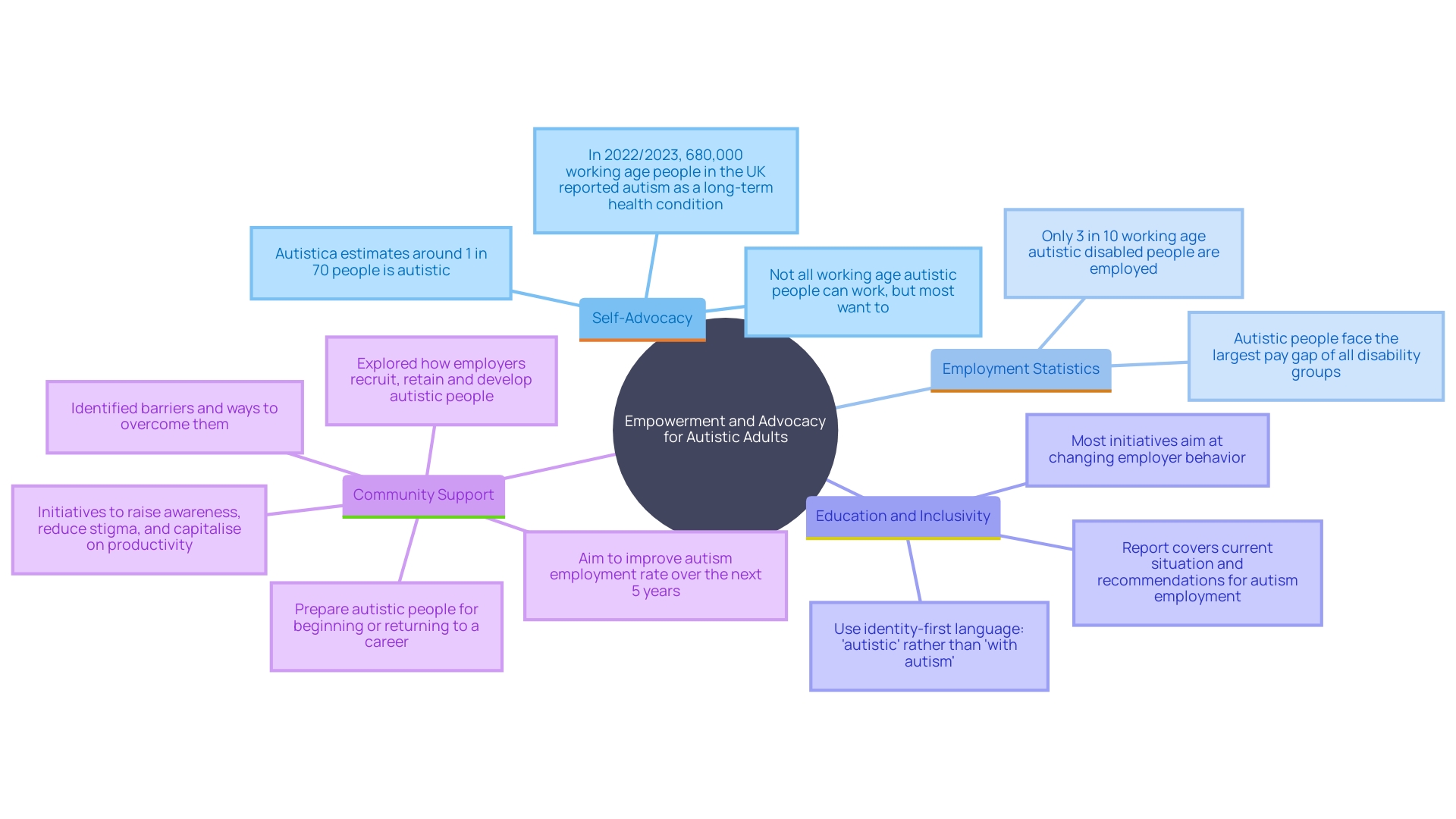
Conclusion
Navigating adulthood with autism presents unique challenges, particularly regarding diagnosis and support. Many individuals receive their autism diagnosis later in life, emphasizing the importance of both formal and self-identification. Initiatives like the Adult Autism Health Resources project and the Interagency Autism Coordinating Committee (IACC) are crucial for improving access to quality medical care for autistic adults.
The transition to adulthood often involves significant hurdles, especially in social interactions and employment, with many autistic individuals facing barriers that hinder their job opportunities. Real-life experiences, such as that of Chelsia Potts, highlight the profound impact of late diagnoses on individuals' lives.
Strong support systems are vital for fostering belonging and acceptance. Community resources and connections can empower autistic individuals, reassuring them that they are not alone. Ongoing support is essential, particularly as many services diminish after high school.
Self-advocacy and education serve as powerful tools for empowerment. By understanding their rights and advocating for their needs, autistic adults can navigate the complexities of adulthood more effectively. This not only benefits individuals but also promotes greater societal understanding.
In summary, with the right strategies, support, and advocacy, autistic adults can lead fulfilling lives. Collaborative efforts from individuals, families, and communities are essential in addressing the unique needs of autistic adults, paving the way for a future where everyone has the opportunity to thrive.




